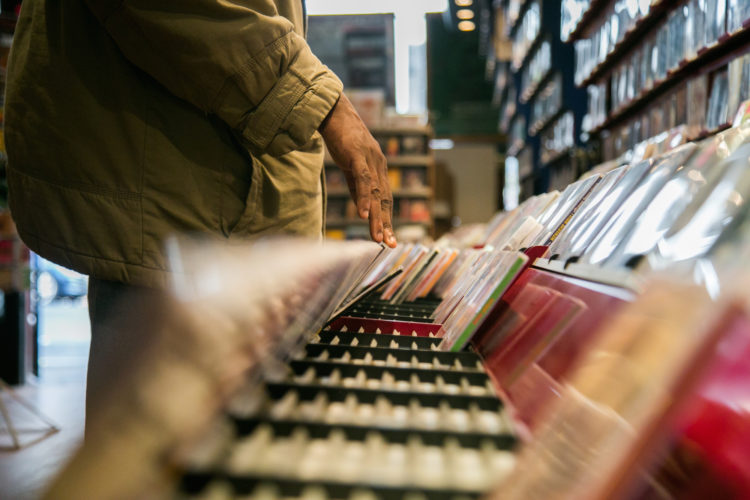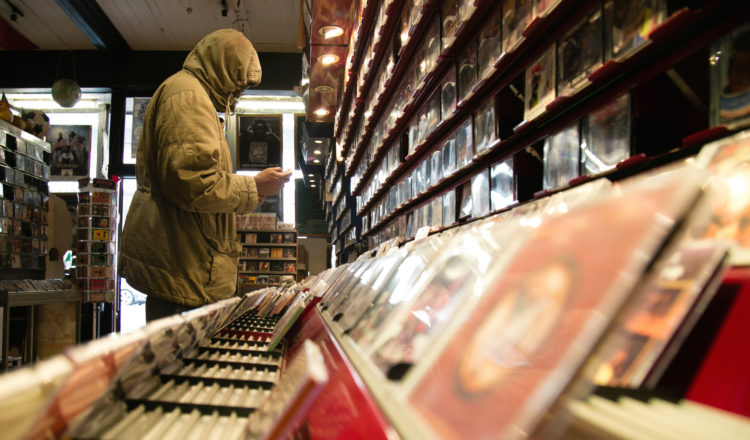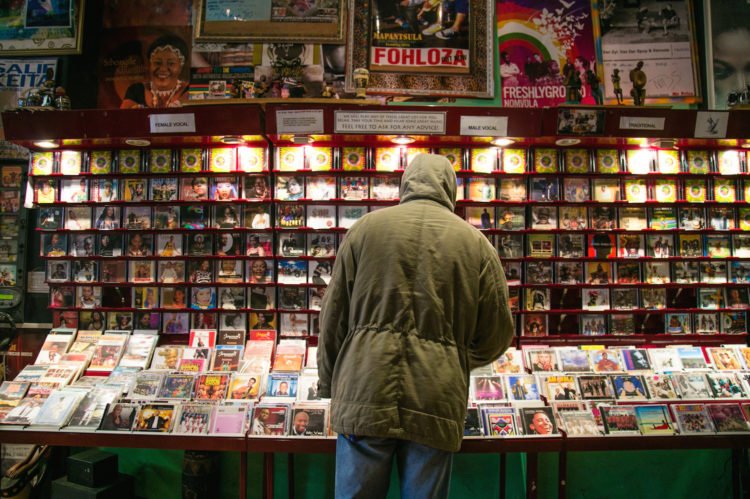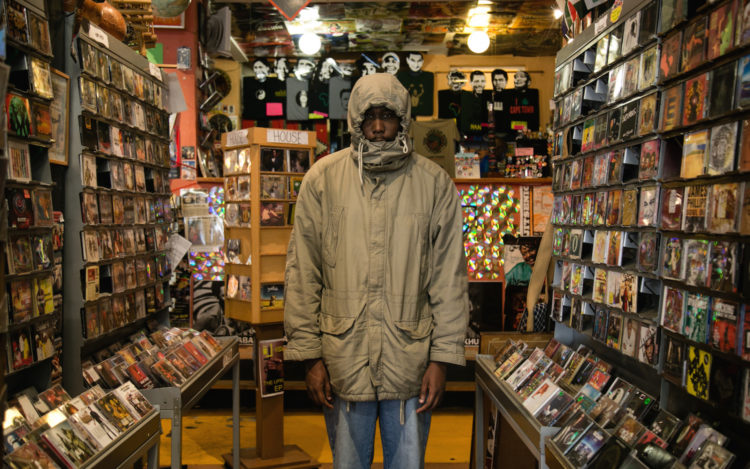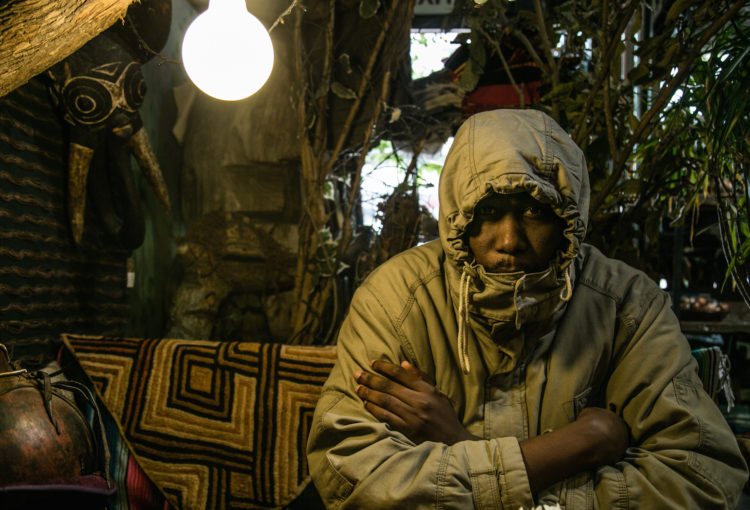When Belgium-born, DRC-raised and now South Africa-based Alec Lomami was last in Kinshasa, he got to meet Papa Wemba at his crib, where the two not only broke bread, but nearly got to make music together. It was a defining moment for Alec, who grew up to the music of a figure spoken of as being larger-than-life, and a man whose musical ideas played a big part in shaping the person the emcee has become today.
‘Unfortunately it’s not gonna happen,’ says Alec over a Skype connection, struggling to process it still, the passing. He hasn’t even seen the video, posted on-line, where Papa Wemba collapsed during a performance at Urban Musical Festival Anoumabo in Abidjan, said to be one of Côte d’Ivoire’s biggest. ‘Think about it, for as long as I’ve lived, he’s been there,’ he adds while reflecting on Papa Wemba’s legacy.
Another thing Alec hasn’t done is release music. There’s been no collection of songs ever since 2012’s Mélancolie Joyeuse EP which featured the Miriam Makeba-sampling Pardon my French on it. He’s been sorting out the cranks at Immaculate Taste in the interim.
Immaculate Taste is the indie imprint behind US-based emcee Well$’s steady rise over the past three years. Between securing beats from the likes of DJ Dahi (Kendrick Lamar, Freddie Gibbs, Vince Staples) and MetroBoomin’ (Future, Drake), obtaining press coverage for Well$ and lending a hand to South African emcee Sipho the Gift’s last project, and doing all while juggling a masters programme in Theological Ethics at the same time, Alec’s been busy.
He still finds time to record. He’s been getting better at it since realising that he let the ball slip for too long, and that his rap credentials were being eroded. He featured on Joburg-based rapper Sam Turpin‘s single named Ascendance in 2015 and premiered the Fresh: Dans La Peau D’un Sapeur video earlier this year. ‘I wanted to highlight the duality of how sapeurs are viewed in DRC as opposed to how they are almost unanimously worshiped in Western publications,’ he said in an interview.
https://youtu.be/juknto0V7iY
We started from the beginning, in Zaire during the Mobutu Sese Seko’s rule.
How was it like growing up during that era?
It was fun, it was chilled, it was cool. [At that time we] dominated a big part of popular music on the continent, so that gave us a great sense of pride in being Congolese.
Growing up in DRC back then was kind of like what South Africa is now.
It’s hard to tell that Congolese music was huge at some point
Yeah, it’s hard to tell for most people, even though if a person knows enough, they can hear its influence in a lot of… if you take the music coming out of the Ivory Coast, Coupé-Décalé, it’s pretty much Congolese music. Congolese music has two parts: the singing part and the dancing part.
What Coupé-Décalé [producers] did is that they took the dancing part and sped it up a little bit. It fits the radio format better, which is three to four minutes instead of 15 minutes long. Even if you listen to their music, you hear a lot of Lingala words. [Ivorians] are the first to say that their music is deeply influenced by Congolese music.
Even if you listen to Nigerian music, you hear a lot of those guitar riffs. It’s still there, the problem is we didn’t have as good an infrastructure as those other areas. So it seems like we are now playing catch-up.
What were you listening to when growing up?
Growing up in DRC back then was kind of like what South Africa is now as far as, besides Western music, you don’t really have other African music that finds its way into South Africa because in the country there’s just so much music already.
The only South African artists that I knew growing up were Yvonne Chaka-Chaka and Johnny Clegg. You had a few of us listening to rap, and we were labelled ‘jeanspillé’.
But the funny thing is the word came from Michael Jackson’s song, Beat it. We didn’t speak English, so when he said ‘just beat it’, people used to say ‘jeanspillé’. Funny enough, five years ago I realised that a lot of these Michael Jackson songs that I grew up on, I was like ‘wait a minute, I don’t even know what the hell he was saying’!
Growing up and seeing this iconic figure sing in your traditional language is what made me want to learn it.
When I was listening to them, I didn’t know a lick of English.
And Papa Wemba just recently passed away
Yeah man, that hit really hard! There have been artists that die that I thought affected me, but I’ve never been as affected by a person that I don’t know the way that I have with him. For one, he’s Mutetela, which is the same tribe that I am from.
Growing up and seeing this iconic figure sing in your traditional language is what made me want to learn it. There was this one song where he was talking about ‘if you go to Europe, don’t let that mindstate distract you or change you so fundamentally to the point that you forget where you come from and never come back home.’ And I was a kid hearing that song, but for some reason that just stuck with me.
So a big part of my strong identity and my focus on Afrocentricity is rooted from something that I heard from him when I was a kid. To me, it’s bigger than just ‘I like his music’. There are things that he has done that actually affected me more. And the craziest thing ever, I’d just got Spotify to work on my computer. Literally the day before, I went on Spotify and the whole day I was listening to his catalogue.
The next day, I’m hearing that he died. It was just so weird.
How are you processing it?
I feel like that’s the second event that really hit me to the point where I’m just like ‘life is short, do the things that you really care for, show love to people that you appreciate because you never know when they’re gonna be gone. Think about it, for as long as I’ve lived, he’s been there. It made me re-focus. Just do what you’ve gotta do, don’t waste time!
And how has moving to South Africa after living in America for song long influence your world-view.
I lived here, I’ve lived in the Ivory Coast…I moved around. Everywhere that I moved, I always felt like I was a part of that community; I was deep in it, I was invested. That’s just the personality that I have, I just get into it. This is the first time that I still feel like a foreigner. I’ve never had that feeling. Even when I was in Ivory Coast, I felt like ‘yo, I’m just one of them’.
My view of South Africa is still a little weird.
When I was in New Orleans, I felt like I was one of them. Yeah, they have their own culture and whatever, but still. Maybe it’s because I’m in Stellenbosch. My view of South Africa is still a little weird. I don’t know enough, so that’s why I’m also very careful to voice any opinion. But for what it’s worth, everytime I go to Joburg I feel at home.
And what are your outsider impressions on the music scene here?
Coming from a total outsider [with] limited information, it seems like a closed circle. Everybody kind of knows each other, so to try to get into it is pretty hard. It’s very cliquey. That’s outside looking in, [and] speaking of Cape Town. I don’t really know nothing about Joburg.
Photography by andymkosi.com

